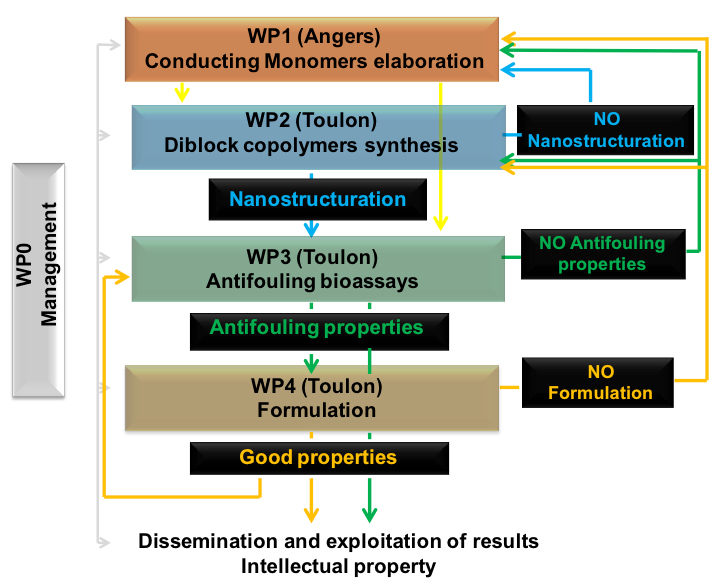AF-ElectroCoatings : New AntiFouling ELECTROactive COATINGS to stop the settlement of marine biofouling on seawater immersed structures
Context
Marine biofouling on materials and equipments leads to fatal effects in numerous civil or military marine applications: military vessels, offshore platforms, oceanographic equipments, and optical sensors. Their consequences are estimated at several billion euros a year, including the costs of maintenance. This colonization leads to an increase of drag resistance and therefore of energy consumption in particular in the sea transport. In addition, this colonization increases the biocorrosion or biodegradation of materials. For sensors, signals could deviate with time. The inhibition of the adhesion of marine organisms on immersed surfaces could decrease the cost but also reduce the emission of greenhouse gas (CO2, SOx, NOx) and limit the transport of invasive species.
Objectives
Development of new strategies of marine antifouling coatings
Antifouling coatings are currently used on surfaces in contact with marine fouling
organisms. The most successful antifouling (AF) paints for several years have been tributyltin (TBT)-based self-polishing paints and have been banned because of environmental concerns.The aim of this project is to develop new non-toxic or ecological AF paints without any toxicants release. New polymer coatings containing electroactive micro(nano)domains will be prepared and characterized for civil and military applications.
The work is an interdisciplinary venture to discover novel polymer binders for paint technologies with long-time efficiency, low volatile organic compounds and no release of biocidal substances.
Strategy
The strategy is based on the synthesis of electroactive copolymers which could self-assemble and lead to micro(nano)-structured surfaces acting on the adhesion or the release of settled marine organisms. Besides the expected non-wetting effect of these structured surfaces, the reversible oxidation/reduction of micro(nano)electroactive domains will inhibit the settlement and the adhesion strength of marine organisms. In addition, electrochemical domains will slow down or inhibit the formation of the initial biofilm according to their redox states. A complete hard fouling elimination could be obtained to avoid maintenance for seawater immersed sensors or ship hulls.

